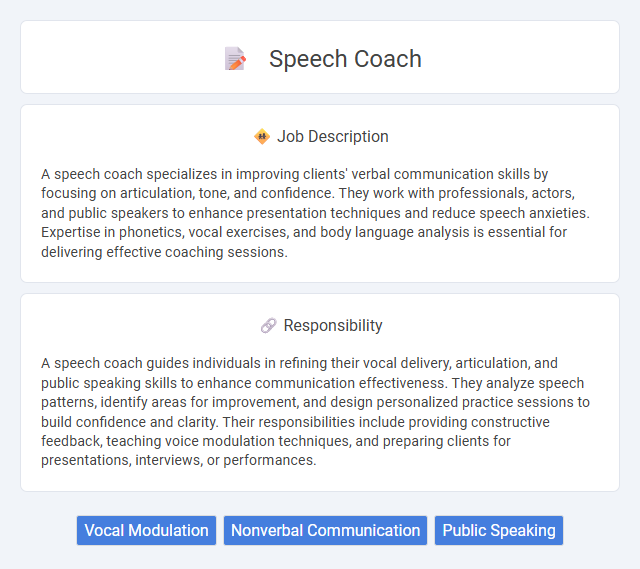
A speech coach specializes in improving clients' verbal communication skills by focusing on articulation, tone, and confidence. They work with professionals, actors, and public speakers to enhance presentation techniques and reduce speech anxieties. Expertise in phonetics, vocal exercises, and body language analysis is essential for delivering effective coaching sessions.
Individuals with strong communication skills and a passion for helping others improve are likely suitable for a speech coach role. Those who enjoy working closely with clients and can maintain patience and empathy might find this job fulfilling. Conversely, people who struggle with interpersonal interactions or prefer solitary work may find it less compatible with their preferences.
Qualification
Speech coaches typically require a degree in communications, speech pathology, or a related field, often supplemented by certifications such as the Certificate of Clinical Competence in Speech-Language Pathology (CCC-SLP). Expertise in voice modulation, public speaking techniques, and language development is essential to effectively tailor coaching strategies to individual client needs. Experience in conducting assessments and creating personalized training programs enhances a speech coach's ability to improve clients' communication skills efficiently.
Responsibility
A speech coach guides individuals in refining their vocal delivery, articulation, and public speaking skills to enhance communication effectiveness. They analyze speech patterns, identify areas for improvement, and design personalized practice sessions to build confidence and clarity. Their responsibilities include providing constructive feedback, teaching voice modulation techniques, and preparing clients for presentations, interviews, or performances.
Benefit
Hiring a speech coach can significantly improve communication skills, increasing confidence and clarity during presentations and public speaking engagements. This improvement likely enhances career prospects by enabling more persuasive and effective messaging. Consistent coaching may also reduce anxiety related to speaking, fostering greater overall professional growth.
Challenge
A speech coach likely encounters the challenge of tailoring communication strategies to diverse individual needs while ensuring effective message delivery. Navigating anxiety and confidence issues in clients could require specialized techniques and patience. Overcoming these obstacles may enhance the coach's ability to foster meaningful progress in public speaking skills.
Career Advancement
A speech coach plays a critical role in enhancing clients' communication skills, enabling career advancement in fields such as corporate leadership, media, and public relations. Mastery of effective speech techniques boosts confidence, aiding professionals in securing promotions and leadership roles within competitive industries. Continuous skill development and specialization in niche areas like accent reduction or executive presence can significantly increase job market value and opportunities for upward mobility.
Key Terms
Vocal Modulation
A speech coach specializing in vocal modulation enhances clients' ability to control pitch, tone, and pace, improving clarity and emotional impact. Mastery of vocal modulation techniques helps speakers maintain audience engagement and convey confidence in public speaking or presentations. Effective vocal modulation training boosts communication skills essential for leaders, actors, and professionals in diverse fields.
Nonverbal Communication
A speech coach specializing in nonverbal communication enhances clients' effectiveness by refining body language, facial expressions, and eye contact. Mastery of microexpressions and posture adjustment plays a critical role in conveying confidence and credibility during presentations. This expertise leads to improved audience engagement and persuasive impact in both professional and social settings.
Public Speaking
Speech coaches specializing in public speaking help individuals enhance their presentation skills, including voice modulation, body language, and speech organization, to effectively engage audiences. They work with clients ranging from business executives to students, tailoring techniques to improve confidence, clarity, and persuasive communication. Expertise in audience analysis and message delivery ensures impactful public speaking performance in diverse settings.
 kuljobs.com
kuljobs.com